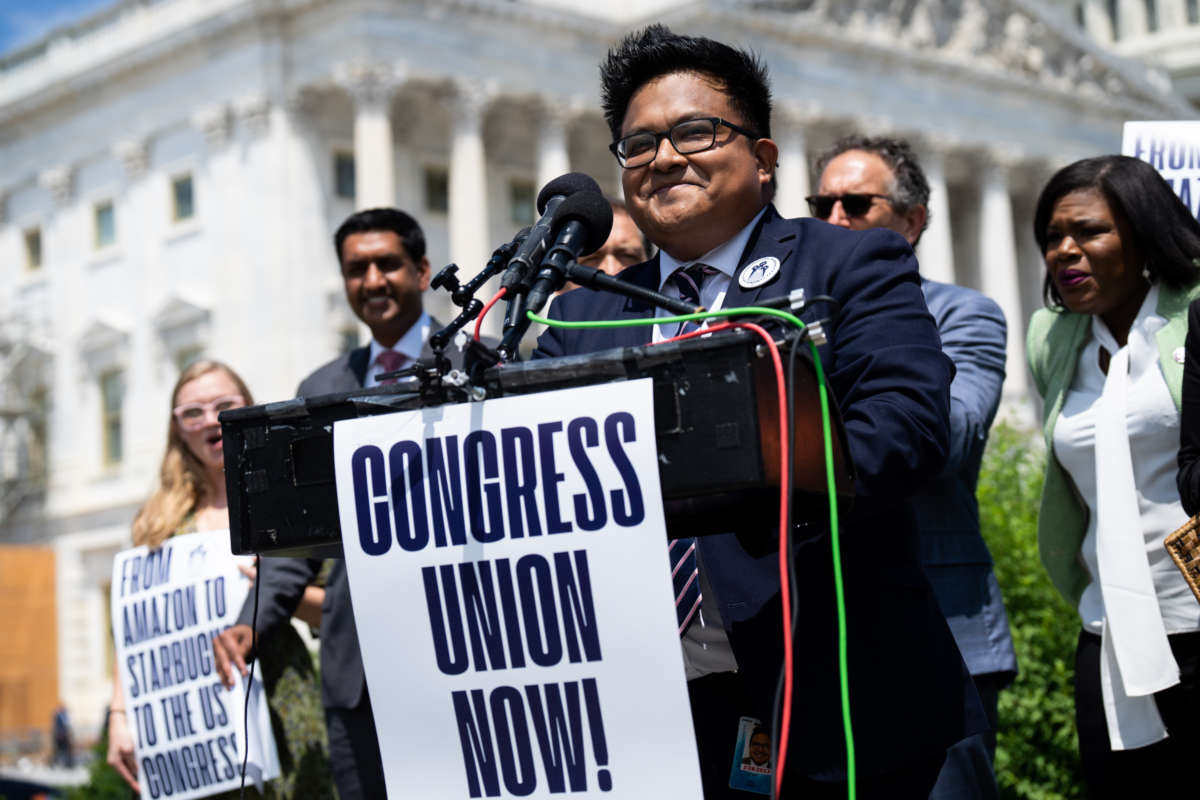The Congressional Workers Union celebrated on Thursday as House staffers began voting on whether or not to form the first-ever union within Congress, a right that was granted to congressional staffers earlier this year by House lawmakers.
Staffers in Rep. Andy Levin’s (D-Michigan) office will be voting electronically on whether or not to unionize on Thursday and Friday. Levin was an original sponsor of the resolution that allowed staffers to unionize and granted them related labor protections; the resolution activated decades-old legislation outlining congressional workers’ right to form unions.
“This is a historic and momentous day for both the labor movement and democracy, as we watch a union election play out for the first time in a congressional office in the history of the U.S. Congress,” the union wrote in a press release.
If a majority of staffers vote “yes” on the union, they will be the first office in congressional history to unionize. The union will be short-lived, however, as Levin was defeated in his primary in August after moneyed interests like the American Israel Public Affairs Committee (AIPAC) and corporate groups spent millions of dollars on his ousting.
However, there may be several other congressional unions that will survive Levin’s, if the vote succeeds. At least seven other offices have filed to unionize so far, including the offices of Representatives Cori Bush (Missouri), Chuy García (Illinois), Ro Khanna (California), Ted Lieu (California), Alexandria Ocasio-Cortez (New York), Ilhan Omar (Minnesota) and Melanie Stansbury (New Mexico).
Though it’s unclear whether or not these offices will, indeed, vote to unionize, nearly all of the lawmakers whose offices will soon be voting have spoken out in support of the union.
“I am so proud of the staffers who made a historic move today,” said Levin in a statement in July, when his office filed a union petition. “It is the workers who ensure that this institution — the bedrock of our fragile and precious democracy — operates efficiently and serves the American people here in the Capitol and in every corner of our nation.”
Once they form a union, workers will be able to negotiate pay and benefits like student loan repayment aid or parental leave, according to Demand Progress.
Though there are Senate workers involved in the union, the chamber has not voted on the corresponding Senate resolution to activate their staffers’ right to unionize, and would likely reject the resolution if it came to a vote thanks to opposition from Republicans and conservative Democrats like Sen. Joe Manchin (West Virginia).
Congressional staffers have long reported poor working conditions in both their offices and the halls of Congress at large. Workers face low pay and often struggle to pay for necessities like child care, while other workers of their caliber are often offered private sector jobs that pay far better, like those in the lobbying sector, for instance.
Non-white workers have it the worst. Research has found that non-white staffers working for lawmakers in both major parties are paid an average of $5,600 less a year in the House and $9,100 less in the Senate. This — and the racist abuse that non-white staffers often face — could be part of the reason why there are so few non-white staffers on Capitol Hill.
When it comes to the union effort, on the other hand, non-white workers have been at the forefront of the movement.
Organizers with the Congressional Workers Union have also been involved in other activist efforts in Congress in recent months. This summer, several organizers within the union participated in a protest in Sen. Chuck Schumer’s (D-New York) office, urging him and President Joe Biden to take action on the climate crisis after Manchin threw cold water on climate-related negotiations in July.
Join us in defending the truth before it’s too late
The future of independent journalism is uncertain, and the consequences of losing it are too grave to ignore. To ensure Truthout remains safe, strong, and free, we need to raise $31,000 in the next 48 hours. Every dollar raised goes directly toward the costs of producing news you can trust.
Please give what you can — because by supporting us with a tax-deductible donation, you’re not just preserving a source of news, you’re helping to safeguard what’s left of our democracy.
